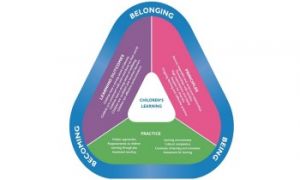

The first few years in a child’s life are when values, ideas and attitudes take shape as the result of their experiences, adult responses and wider cultural influences. This is the time when positive role models can convey powerful lessons on gender equality and interpersonal behaviour which have the potential to impact adult life choices. For such reasons, the following article provides information on Traditional Bias, How Men Are Important, How To Encourage Men To Join The ECE Setting and more.
Effective communication is at the heart of every productive workplace but more so in sectors like ECE where so much depends on positive interactions between key stakeholders, like children, educators, families, management and providers. Non-verbal cues are an integral part of communication as they can complement and reinforce but also contradict and undermine verbal messages. The following article provides information on What Is Non-Verbal Communication, Why It Is Important, How To Use Non-Verbal Communication In The Workplace and more.
As part of their educational programmes, early education and care services may be situated in or travel to bush environments where it is known that snakes may be active and present. Although they are more common in the spring or summer, snakes can be found throughout the year, especially on sunny days. The following article provides information on What Attracts Snakes Into The Outdoor Area or Early Childhood Service, How Can We Snake-proof Our Service, Strategies to Implement To Minimise The Risk Of Snakes and more.
In the early education context, assessment for learning is best practised as a “process of gathering and analysing information as evidence about what children know, can do and understand”, according to the EYLF. The approved learning framework is categorical that such assessment should be “part of an ongoing cycle that includes planning, documenting and evaluating”. Such ongoing processes lie at the heart of formative assessment practices. The following article provides information on What Is Formative Assessment Practices, Formative Assessment Regulatory Guidelines, and Benefits Of Formative Assessment and more.
Consequences are one of the most effective principles of behaviour management in ECEC settings, as they show children the probable results of their own actions. There are two types of consequences used most often – natural and logical. The following article provides information on Natural consequences, How To Use Natural consequences, Logical consequences and more.
Both the Principles and Practices of EYLF place great significance on the nature of child-educator interactions. The following article provides information on What Are Positive Interactions, Developing Positive Interactions, Strategies and more.
Play is a process that is freely chosen, personally directed and intrinsically motivated. In this sense, children’s play happens when children determine and control the content and intent of their play, following their own instincts, ideas and interests, in their own way for their own reasons. The following article provides an overview of the different roles of educators in play and how each can be best performed in an ECEC setting.
Saying sorry is among the earliest lessons in interpersonal behaviour that children learn when growing. There are indeed many benefits of an apology but adults forget that almost always they depend on both sides genuine feeling the emotions rather than being forced to go through the motions. The following article provides strategies to support children to say sorry more meaningfully.
Interactions with children and families lie at the heart of ECEC practices. Early educators as a result may find themselves frequently facing ethical issues which are all too common in professions revolving around human relationships with their spectrum of rights, responsibilities, needs and desires. The following article provides information on Identifying Ethical Issues, Ethical Responsibilities, Case Study and more.
Transitions are among the most significant factors that determine the well-being of young children. Their sense of ease, ability to learn and the nature of attachments are vastly impacted by how they experience transitions in the ECEC setting. The following article provides information on Theories and Transitions, Different Types Of Transitions, Benefits Of Planning Transitions With Families and Children and more.
 Open ended questions cannot be responded to with one word answers such as yes or no. These types of questions enables a child to provide… Read More
Open ended questions cannot be responded to with one word answers such as yes or no. These types of questions enables a child to provide… Read More
 During your child’s preschool years, an important milestone begins to emerge. This is the development of pre-writing skills. Pre-writing skills are used to encourage, develop… Read More
During your child’s preschool years, an important milestone begins to emerge. This is the development of pre-writing skills. Pre-writing skills are used to encourage, develop… Read More
 Open ended materials enables children to play freely. They are objects that have no rules to follow, use or function. Raw materials that can be… Read More
Open ended materials enables children to play freely. They are objects that have no rules to follow, use or function. Raw materials that can be… Read More
 An Acknowledgment of the Country is a way of showing respect for the Traditional Owners and can be given by both non-Indigenous people and Aboriginal… Read More
An Acknowledgment of the Country is a way of showing respect for the Traditional Owners and can be given by both non-Indigenous people and Aboriginal… Read More
 Language plays an important role in a child’s development. It enables a child to communicate effectively with their family, learn at school, socialize with friends,… Read More
Language plays an important role in a child’s development. It enables a child to communicate effectively with their family, learn at school, socialize with friends,… Read More
 Like adults, children have to deal with their own stress in life. Moving house, starting a new school, preparing for a new sibling - these are… Read More
Like adults, children have to deal with their own stress in life. Moving house, starting a new school, preparing for a new sibling - these are… Read More
 Playdough is such a versatile material. It provides numerous benefits to children as they manipulate it, it is safe and soothing and provides children with… Read More
Playdough is such a versatile material. It provides numerous benefits to children as they manipulate it, it is safe and soothing and provides children with… Read More
 Teaching children about sustainability enables them to appreciate and respect the natural environment. Early childhood services can provide meaningful hand on learning experiences in order… Read More
Teaching children about sustainability enables them to appreciate and respect the natural environment. Early childhood services can provide meaningful hand on learning experiences in order… Read More
 Recycling is an important concept that teaches children to care for the environment. It encourages children to be responsible and show a growing appreciating for… Read More
Recycling is an important concept that teaches children to care for the environment. It encourages children to be responsible and show a growing appreciating for… Read More
 When children apply paint to paper, glue things together, or pound a lump of clay, they experiment with colour, shape design and texture.
Read More
When children apply paint to paper, glue things together, or pound a lump of clay, they experiment with colour, shape design and texture.
Read More

On the 14th of March, it is Holi. Holi is one of the biggest Hindu festivals...
See more...
Andy Warhol was one of the most famous American artists of the latter half of...
See more...
The My Time Our Place Framework provides broad direction for school age care educators in...
See more...© 2009-2025 Aussie Childcare Network Pty Ltd. All Rights Reserved.

